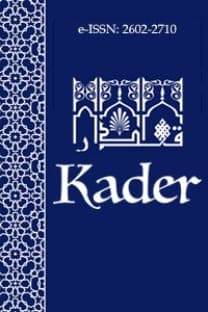ÇEVRE SORUNLARI KARŞISINDA SORUMLULUK ETİĞİ
The effects and consequences of environmental disasters are increasingly manifesting their effects on our daily life such as air pollution, water intoxication and climate changes. With its social, political, religious, and philosophical aspects the environmental problems have been transferred into global ones. In this essay I will discuss the environmental problems through two fundamental paradigms: the first paradigm is the anthropocentric worldview which is considered the cause of all environmental issues. The other paradigm is responsibility ethics with its deep roots in the western philosophy and in the Islamic philosophy as well, which is considered as the cure for environmental issues. Both understandings will be embraced in a life-centered, holistic perspective about life and existence. This understanding will be grounded by reference to the holistic cosmological understanding of the first known Islamicmoralists, Ikhvanu?s-Safa.
Anahtar Kelimeler:
-
-
The effects and consequences of environmental disasters are increasingly manifesting their effects on our daily life such as air pollution, water intoxication and climate changes. With its social, political, religious, and philosophical aspects the environmental problems have been transferred into global ones. In this essay I will discuss the environmental problems through two fundamental paradigms: the first paradigm is the anthropocentric worldview which is considered the cause of all environmental issues. The other paradigm is responsibility ethics with its deep roots in the western philosophy and in the Islamic philosophy as well, which is considered as the cure for environmental issues. Both understandings will be embraced in a life-centered, holistic perspective about life and existence. This understanding will be grounded by reference to the holistic cosmological understanding of the first known Islamic moralists, Ikhvanu’s-Safa
Keywords:
Environmental ethics, anthropocentrism, responsibility ethics, life centrism Ikhvan’s-Safa,
___
- Akdur, Recep, Avrupa Birliği Ve Türkiye’de Çevre Koruma Politikaları, “Türkiye’nin Avrupa Birliğine Uyumu”, Ankara Üniversitesi Avrupa Topluluğu Araştırma Ve Uygulama Merkezi Araştırma Dizisi:23, Ankara 2005.
- Alexander, Ulfig, Lexikon der philosophischen Begriffe, Frankfurt am Main 1997.
- Bayertz, Kurt, “Eine kurze Geschichte der Herkunft der Verantwortung”, in Ders.(Hg), Verantwortung. Prinzip oder Problem?, Darmmstadt 1995.
- Beck, Ulrich, Risikogesellschaft, Auf dem Weg in andere Moderne, Suhrkamp Verlag, Frankfurt am Main 1986.
- --- Weltrisikogesellschaft, auf der Suche nach der verloren Sicherheit, Suhrkamp Verlag, Frankfurt am Main 2007.
- Düzgün Şaban Ali, Sarp Yokuşun Eteğinde İnsan, Lotus Yay., Ankara 2012.
- Eren, Mustafa, Die Diskussion über die zeitgenössische Globalethik im Kontext von Hans Küng und Iḫwān aṣ-ṣafāʾ, Frankfurt am Main 2013, Basılmamış Doktora Tezi
- Ertan, Kıvılcım Akkoyunlu, “Çevre Etiği”, Amme İdaresi Dergisi, Cilt 31. Sayı 1. Mart 1998, 125-139.
- Ichwan as-Safa, Mensch und Tier vor dem König der Dschinnen, Aus den Schriften der Lauteren Brüder von Basra, Alma Giese (Hg). Lenningen 2005, XXVIII.
- Jonas, Hans, Das Prinzip Verantwortung, Versuch eine Ethik für die technologische Zivilisation, Suhrkamp Verlag., Frankfurt am Main 1979.
- Naess, Arne, The Deep Ecology Movement: Some Philosophical Aspects. In: Zimmerman, Michael E. (Ed.) (1993): Environmental Philosophy. From Animal Rights to Radical Ecology. Englewood Cliffs, New Jersey: Prentice Hall. 193-212.
- Nasr, Seyyid Hüseyin, İnsan ve Tabiat, İstanbul 1991.
- Oruka, H. Odera, “ Günümüzde Felsefe Ve İnsanlık”, içinde: Dünya Problemleri Karşısında Felsefe Uluslararası Semineri, (Editör), İonna Kuçuradi, Kurtuluş Dinçer, 7-10 Temmuz Ankara 1986, 45-57.
- Özdemir, İbrahim, “ Çevre Sorunlarının Antroposentrik Karakteri” Felsefe Dünyası, Sayı 27, 1998, 68-80.
- --“Çevre Bilincinin Gelişmesinde Çevre Ahlakının Önemi”, Ankara Üniversitesi İlahiyat Fakültesi Dergisi, Özel Sayı, Cumhuriyetin 75. Yıldönümüne Armağan, Ankara, ( 291-317).
- Said, Abdül Aziz, Funk, Nathan, C., “İslam’da Barış: Bir Maneviyat Ekolojisi”, ,içinde: Richard C. Foltz, Frederick M. Denny, Azizan Baharuddin (Hg), İslam ve Ekoloji, İstanbul 2003, 155-177.
- Sartre, J.P., Der Existentialismus ist ein Humanismus und andere philosophische Essays, Hamburg 200.
- Scheler, Max, Die Stellung des Menschen im Kosmos, Nymphenburger Verlag, München 1947.
- Schönherr-Mann, H.M., „Ist Verantwortung moralisch? Niedergang oder Wiederkehr http://www.hirzel.de/universitas/archiv/schoenherr.pdf 22.01.2015. Werten in der politischen Ethik“,
- Schweitzer, Albert, Die Erfuhrt vor dem Leben, Grundtexte aus fünf Jahrzehnten, Hans Walter Bähr (Hg), C.H.Beck Verlag, München 1966.
- Ünder Hasan, Çevre Felsefesi Etik ve Metafizik Görüşler, Ankara 1996.
- Weber, Max, Politik als Beruf, Nachwort von Ralf Dahrendorf, Philipp Reclam jun. Stuttgart 1992.
- White, Lynn, “ The Historical Roots of Our Ecological Crisis”, Science, New Series, Vol.155, No. 3767, (Mar. 10, 1967), 1203-1207.
- Yoldaş, Yunus, “Max Weber’in (Siyasi) Sorumluluk Etiği Anlayışı”, Süleyman Demirel Üniversitesi, İktisadi ve İdari Bilimler Fakültesi, Y.2007, C.12, S.2, 199-218.
- Zerzan, John, The Iron Grip of Civilization: The Axiel Age“ http://green- anarchy.wikidot.com/the-iron-grip-of-civilization-the-axial-age 06.01.2015
- Başlangıç: 2003
- Yayıncı: Mehmet BULĞEN
Sayıdaki Diğer Makaleler
HZ. PEYGAMBER?İN AYRICALIKLI YÖNLERİNİN TEVARÜS ETMESİNİN İMKÂNI (İSMET SIFATI ÖRNEĞİ)
ÖTENAZİ SORUNSALINA TEOLOJİK AÇIDAN BİR BAKIŞ
IŞİD DÜŞÜNCE YAPISININ TEOLOJİK ARKAPLANI
Ehl-i Sünnet?in Siyâsî Temâyülü Olarak Osmâniyye ve Osmânîler
HANS KÜNG ile KÜRESEL AHLAK ÜZERİNE
OSMANLI DÖNEMİ EŞ'ARÎ MEZHEBİNİN GÜÇLÜ OLMASININ MUHTEMEL SEBEPLERİ
ERKEN DÖNEM İSLÂM?IN ATOM ÖĞRETİSİ
ORTAÇAĞ HORASANINDA SAPKIN BİR POLİTİKA: NİŞABUR KERRÂMİYYESİ
Hüseyin DOĞAN, Margaret Malamud
MUHAMMED ZAHİDÜ?L-KEVSERİ?NİN REF? VE NÜZÜL-İ İSA GÖRÜŞÜNÜN KELÂMİ AÇIDAN DEĞERLENDİRİLMESİ
